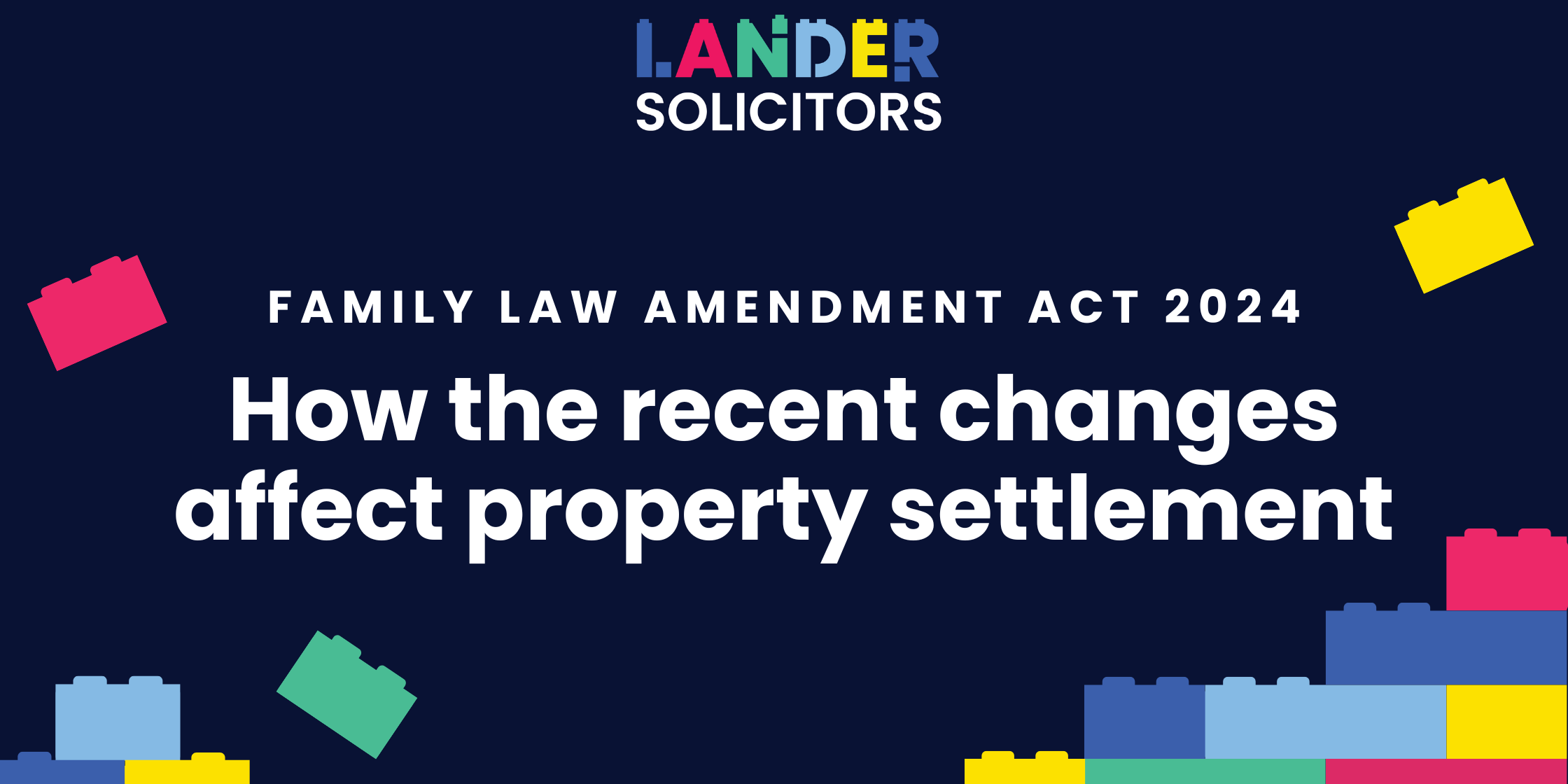If you’re separating or considering a property settlement, know that as of June 2025, there are new changes to family law in play.
The Family Law Amendment Act 2024 could affect your financial agreement, even if you’re settling out of court. The reforms reshape how courts and families deal with property, money, family pets, and financial abuse after a relationship breakdown.
At Lander Solicitors Queensland, we’re here to help you understand what’s changed, and how these updates might apply to your situation.
Family Law Amendment Act 2024: what’s changed?
The Family Law Amendment Act 2024 introduces several key updates aimed at making the legal process fairer, safer, and more transparent for separating couples.
Here’s what’s new:
1. Family violence can now impact property settlements
The court can now consider how family violence, including emotional or financial abuse, has affected one party’s economic situation when dividing property.
This might include:
- Lost income due to abuse or control
- Damage to earning capacity
- Limited access to shared assets
- Financial stability
Previously, the impact of violence on someone’s financial position wasn’t always clearly recognised in property matters. These changes make sure that lived experience is factored into the final settlement.
2. Financial abuse is explicitly recognised
The family law act amendments now makes it clear that economic or financial abuse is a form of family violence. Financial abuse can look different in every relationship, but common examples include:
- Controlling or restricting access to bank accounts or cash
- Using your money without permission or making financial decisions on your behalf without your input
- Pressuring you to take on debt or sign legal documents
- Refusing to contribute to shared expenses or child support
- Blocking you from working or earning your own income
- Using your identity to apply for loans or services without consent
- Dowry abuse (relevant in some cultural marriages)
By recognising these behaviours in law, courts can now consider how financial abuse has harmed a person’s ability to recover financially after separation.
3. Clearer rules on property division
The updated family law act sets out a more structured approach to how property is divided. Courts now have clearer guidance, which means decisions should be more consistent and easier to understand for all parties.
The Amendment Act includes a new list of factors the court will consider, taking into account:
- Family violence
- Reckless or intentional wastage of financial resources
- Impacts of liabilities
- Housing needs for the care of a child under 18
4. New rules about pets in separation
For the first time, family pets (companion animals) are being recognised in property settlements. The new framework under these family law act amendments allows courts to consider ownership of the family pet, with factors including:
- history of actual or threatened abuse towards a pet
- attachment by a party or a child of the relationship to the pet
- ability of each party to care for pet in the future
5. Courts can now take a less adversarial approach
In some cases, especially those involving family violence, the court now has more freedom to manage matters using a less adversarial approach. For example, remote attendance in cases of violence and changes to the rule of evidence can mean:
- Greater flexibility in the hearing process
- More streamlined evidence requirements
- Less courtroom stress for vulnerable parties
For people in high-conflict or high-risk situations, this change can make an intimidating process feel safer and more manageable.
6. Stronger rules about financial disclosure
The duty to disclose your finances is now embedded in legislation. This means:
- Both parties must be upfront about assets, debts, income, and expenses
- Hiding or delaying disclosure could have more serious consequences
- It’s easier to hold someone accountable if they’re not playing fair
When do the recent changes in family law apply?
Most of the changes began on 10 June 2025. They apply to all new and ongoing cases, unless a final hearing has already started.
So even if you’ve already started negotiations or filed proceedings, these updates may still affect your matter.
Will the Family Law Amendment Act 2024 affect parenting arrangements too?
No, the 10 June 2025 changes relate specifically to property and financial matters, including pets and disclosure. Separate reforms (Family Law Amendment Act 2023) have been made in relation to parenting and parental responsibility. If you’re dealing with both property and parenting issues, we can help you understand how both sets of rules apply.
Need help understanding how the family law act changes affect your property settlement?
If you’re separating or working through a property settlement, we’re here to help.
We know family law is filled with legal terminology that can feel hard to navigate. Our role is to explain what’s relevant in your situation and what your next steps should look like. We can explain what you need to know in plain English and help you make confident, informed decisions.
Get in touch today for advice personalised to your situation.
Family Law Amendment Act 2024 FAQs
Do these changes apply if we’re not going to court?
Yes. Whether you’re finalising your settlement with lawyers, through mediation, or by court orders, these changes apply to everyone (except in cases where a final hearing has already begun).
We separated before 10 June 2025, do the new laws still apply?
In most cases, yes. If your matter hasn’t reached a final hearing yet, these new laws still apply.
If we agree on everything, do we still need to worry about the changes in family law?
Even in amicable separations, it’s important to understand the new legal framework, especially to make sure your agreement is fair, enforceable, and reflects your rights.
What if I’m worried my ex is hiding money?
With disclosure rules now part of the law itself, there are clearer pathways to deal with nondisclosure. We can help you request full financial documents and ensure compliance.
DISCLAIMER – The information provided in this blog is general and does not consider your individual legal needs or objectives. It does not constitute personal advice and is for informational purposes only. We recommend seeking out professional and independent legal advice from qualified Australian lawyer to advise on your individual situation before acting on any information contained below. Lander Solicitors Queensland accepts no express or implied liability for negligence or contractually for reliance on any information provided. Liability limited by a scheme approved under Professional Standards Legislation.







